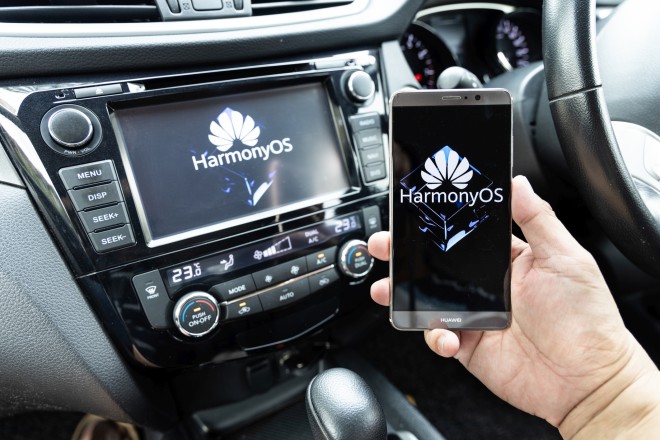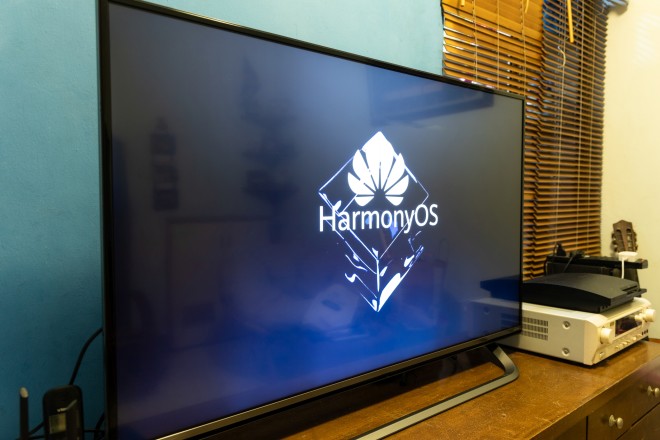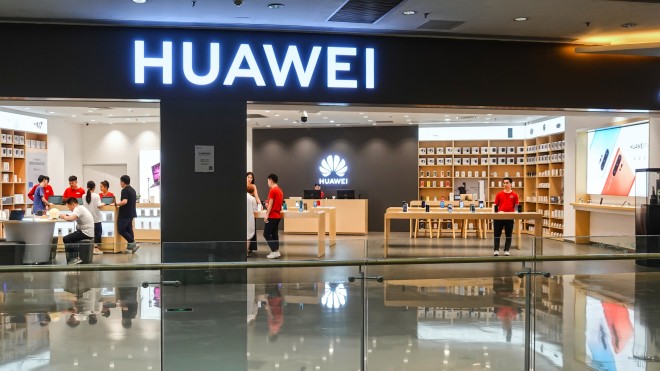The trade war between the US and China is raging on, and it's prompting both parties to look for ways to reduce their mutual economic dependency. In the IT sector, one of the biggest bargaining chips is the declaration of a national emergency concerning telecommunication, as already done by president Trump. This decree can, and already has been, used to ban Chinese companies from cooperation with US companies. And it has become painfully obvious that companies like Huawei, so far, don't have viable alternatives once they're cut off from cooperation with Alphabet/Google. Naturally, the most prestigious Chinese company didn't take this lying down, which is why Richard Yu, CEO of Huawei, recently presented an operating system poised to run on virtually every device, including cellphones, tablets, TVs and cars. Enter Harmony OS.

The goal: A super-lean, fully compatible OS that runs on any device that requires a dedicated operating system. Cellphones and tablets are the first that come to mind but that's only the tip of the iceberg. Smartwatches, smart speakers, cars, refrigerators, dolls—they're all potential candidates for Harmony OS. This means Harmony will bridge the gap between low-spec devices, like toys with only a few KBs of RAM, and beefier gadgets with multiple gigabytes, putting and end to OS fragmentation in the mobile realm. The internet of things, with its billions of devices from surveillance cams and smart fridges to industrial robots, could theoretically run entirely on Harmony OS. And, while feature trade-offs would certainly still have to be made, one OS means less incompatibilities and easier inter-device communication.
For all of this to work, Huawei are basing their OS on a microkernel rather than going the traditional monolithic route. As the name implies, microkernels are minimalist operating system kernels that provide only the most basic of mechanisms, such as low-level memory management, thread management and inter-process communication. Other services, like networking, are kept out of the kernel and run in what is called user-space. In contrast, Windows, macOS and Unix-based OSes typically use monolithic kernels that contain all operating system core functions and device drivers. Think of a microkernel as a janitor with a few clearly defined tasks and a handful of keys to perform said tasks. Accessing additional rooms requires the help of service workers, each with their own dedicated keys. With monolithic kernels, the janitor practically has all the keys and can access any room at will. Though this creates less overhead, since there's no need to ask for help to get into certain rooms, it also poses a security risk. Harmony OS is therefore believed to be a fairly secure system.

One of the biggest hurdles: Customers in the west are unlikely to jump on the bandwagon. If you find it funny that your grandparents always go the same restaurant, they've got nothing on the technological conservatism of cellphone users. Many of them expect (and demand) that everything looks and works the way it has always been and pleasurably pick new features to pieces in online groups and forums. Confronting these folks with an entirely new OS might not be a good idea. So what can you do? You can either copy the dominant systems to a fault or experiment with new ideas without veering too far off the beaten track. The latter can be difficult, as competitor Xiaomi found out with their own MIUI user interface. It was only after the switch to vanilla Android that they gained considerable traction in the mobile marketplace. Another roadblock: Harmony-based cellphones may completely lack Google's services—a veritable no-go for western customers. Naturally, the entry barrier for Harmony OS is a lot lower in China, where Google's services are blocked anyway.
Even if Huawei manage to mitigate or eliminate the aforementioned issues, one major obstacle remains: apps. Nowadays, it's apps that make or break a product. If you've witnessed the slow and sad demise of Windows Phone, you'll agree that, unless all popular apps are available, and I'm talking about the real deal, not some feature-trimmed crutch, any new platform will face an unwinnable uphill battle. In this respect, Huawei have set the bar exceptionally high for themselves: In the future, all HTML 5, Linux and Android-based apps are said to run on Harmony OS. They're promising no less than total compatibility. Time will tell whether the platform can live up to this lofty promise. But let's say they manage to pull this off, how are users going to get their apps? They almost certainly won't have access to Google Playstore. Huawei will have to come up with their own China-based app store, and that alone could make some users feel uneasy about new installations.

After all,trust cannot be implemented, it has to be earned. This is where Huawei will face their toughest battle yet. Alleviating western fears that a device purchase exposes them to Chinese authorities is no easy feat. Perhaps that is why Huawei have open-sourced their new OS. Hundreds of thousands of tech-savvy enthusiasts now have the option to vet every single line of code for potential backdoors. Also, Huawei are working hard to plug their OS to other companies—and things are looking promising in the Asian marketplace, not least because of past (US-inspired) events. We as end-users will have to wait for the first public release to form our own opinions. In any case, competition is good for business so: Welcome, Harmony!
What I would like to know: Are you willing to trust a Chinese-made operating system?




An open source alternative to the Microsoft, Apple and Google conglomerate? Why not, but I'm not jumping in with both feet. I will wait and see what happens with this crazy trade war the Americans are waging.
It's just a matter of time when Americans (and its supporters in the West) will see prices for goods begin to bloat. This Black Friday and Xmas after that will be interesting to see how this plays out. The USA has the most duped and deluded population in the world. The extent of they're collective ignorance (thanks to the greedy corporate desire to maximize profits) has turned them into a mass-consumer culture. The average personal debt is more than $38,000 each, not counting mortgages, which is nuts! Let's see what happens when their dollars buy a lot less. Even the Japanese and Koreans are having products made in China because it makes economic sense (for now).
As far as snooping and privacy issues go, I'd rather trust a company that hasn't offended me (yet) than one that has.
@Ashampoo Customer 29 Programs Worth. The Best Phone That I Ever Had Was A Huawei And I Would Get A New One In A Heart Beat If They Became Available.
I Think That All The Junk That Came Up About Them Was An Excuse To Cut Off Huawei And Cut A Sweetheart Deal With Samsung Which Is The Worst Phone I Ever Had And Now The Only One Really Available From Both My Service Provider And My Friends Service Provider.
We The People Suffer So Our Politicians Can Get Rich From Shady Business Deals. And That is What It Was
The Chinese should just cut their losses. The closest they're going to get to agreeing with western nations on workable terms for internet issues would be agreeing with the Japanese and other Asian nations on some kind of a common firewall that could be configured uniquely by each of the eastern nations. Seriously, this is the only workable option long term with China. Think it through fully. Almost the same thing with Russia, but they have the option of separating the internet from government internet activity. This could be popular sometimes, even in, say, France, where tourism is important (proportionally to the country's size/population).
Eastern culture will always be protective. This is not something to despise, rather something to work with and around when necessary.
Everyone seems to forget that Trump is just after one thing. He wants America to be competitive again. I respect his view on that thinking. We can never again afford to sit back and wait for the world to run the United States for us. Thankfully, Trump is having success and leaders are slowly beginning to trust him. Problem is...what comes after Trump? Just for the record...Putin goes out at the same time. Scary times could be just on the horizon if principled leadership is not in place...
I'm willing to trust a Chinese-made operating system.
Interesting and well written article Sven.
I have concerns about the Harmony OS but would probably use it. I am writing this on a Xiaomi phone and it could well be bugged too. This phone is extremely good and half the price of a Samsung with equal processer and components. It has a dual camera, one Sony and one Samsung!
As a retired person my activities are probably not of much interest to the Chinese Government so a Harmony OS would probably not compromise anyone's security.
If I was a diplomat I would not use the Harmony OS.
So you are asking if I would trust a company from a country where they have created a social score allowing/disallowing me privileges, where they have intern-camps for people that dis-agree, who have been stealing IP form companies around the world, who are selling forced organ donation? If I understand, then if we go along with this, they will provide the OS for all devices, eliminating the need for alternative technologies, allow all devices over time to be solely "managed" by this OS until there are no alternatives, and then possibility some time in the future force a release of an update with all sorts of surveillance technology, which you can't stop, onto all your devices? I think I will pass.
I'm certainly a long way removed from being pro Chinese, but in the current climate I'm also far from being pro American. As far as is both possible and practicable for me I eschew the "favorites" (I won't touch Apple although reluctantly use Windows, but with Firefox/Thunderbird, LibreOffice and etc, avoiding Microsoft wherever practicable for me).
So if independent user/reviewers found a Huawei-sourced OS to be practicable I would certainly try it although I'm devoted to YouTube so would be unwilling to lose that!
Huawei makes a good mobile device and it seems the trade wars are a barrage for what really is behind the US governments intervention between countries business operations. What the public is seeing is all done with mirrors which will cost people money in the long run, so designed to keep the economy afloat. I would use a Huawei mobile phone it if had access to the Internet. Why should Google win everybodies vote? There is room for competition, so open-up that Huawei App store soon Huawei and inform the boys and girls.
نعم انا اثق
When I retired, I no longer needed to use any Microsoft software or OS. My PC at home home was on its last legs so I bought a Chromebook to see if it could do what I wanted. It could and it did. My Chromebox (which I am using now), new Chromebook which my wife is using at the moment, ASUS Flip and Android Tablet (both packed ready to go on holiday) and our Android phones together with our Google Drives in the cloud give us a seamless experience wherever we can get a WiFi signal (or even 4G).
The added bonus is that I am not paying for MS Office - I always used Open Office at home anyway, and no-one at work noticed the difference - nor do I need to bother with anti-virus or firewall software.
Google/Chrome/Android suit me to the ground, give me all I need and the flexibility and portability that I want.
@Ashampoo Customer (retired Manager), you asked, 'If the Chinese opt for open source, open system and a basic core for others to add on. Then I believe it is a good solution.'
Huawei announced it will be open-source during a large conference, also mentioned in this article.
You'll even be able to run Linux packages on it. It has a compiler to port other OS software to it, including Android APKs if I understood it properly.
Don't get too excited, though. Huawei is opting to use Android primarily on mobile devices, so it may not be around for some time to consumers; Harmony is "plan B".
I was an It mangernow retired. I can tell u what happens
in our country on software IP prosecution.
I wanted to promote open source or cheap sw such as Open
Office Org or products like Asamphoo offered in my
company (a franchise credit card co) Myh boss and other dept heads and my
staffs would have none of it.
In the end we settle for corporate
license from Microsoft on Office suite
and five copies from Adobe on discount.
The salesman told me Microsoft sold Office
suite to our Govt at even steeper discounts
and most school teachers got one copy at low
rate but the students had to buy their own
copy at sudent price (which is 25% lower than
discounted retail).
I didnt think much about it, until I retired
and my Windows 7 PC went bust, I had to buy a new
PC with Win7 prepaid & presintalled and buy my own
copy of Office suite. This happens again when my PC
went bust again a few years later. I had to go to
a DIY shop to assemble for me a PC with Win7. This
is due to some sw purchased earlier (such as FXFoto,
Nero Burner, and photoprinter and scanner etc)
do not run on Win7 and some like FXfoto is no more
in business.
MS keeps coming up with Windows media edition,
Win8 and now Win10, and now yearly license or even a
pay per use model. My inlaw who is a retirned civil
engineer using Adobe product now cannot buy it for his
parttime work as he is not working for that company officially.
Here is my take :
I dont mind paying a software uprade fee if the update
brings improvement in speed (e.g. for faster processor)
or new functions such as new video format such as MKV
for video editing; but only at reasonable price and
at least 5 yr interval. The virus protection again
I am willing to pay at nominal fee. I dont really use
my PC for any commercial work, only for internet surfing
some graphic / video editing / email / word processing /
and my financial matters.
Hence I really dont mind a basic OS if it runs on a
PC without the need for yearly upgrade, I can choose
my own 3rd party sw as I found I do need more than one
graphic or video editing software as they each had features
the other does not have.
If Harmony can fits this and had the support of PC maker
and 3rd party sw developers, it had my full vote.
As for trust, it was just reported Facebook had a
privacy issue with a progrm for children and last week
Apple iphone stored their AI voice conversation with
users for 50 days in their servers (which can be used
by any govt agency no doubt). So who can u trsut these
days? Not the Chinese, not the US, in fact NO ONE.
If the Chinese opt for open source, open system and
a basic core for others to add on. Then I believe it
is a good solution. U can always add on your secuirty
layers to protect yourself if you are technically capablle.
With MS Windows or Goggle, u have no chance at all.
Thank you Sven for a well crafted article on the future Harmony OS. Every OS starts out lean, and gets bloated as new features are added with backwards compatibility. I am willing to try the Harmony, as long it is easy to learn, smooth, secure, and ghostlike, working in the background, and never intruding into my purview. Huawei has to go out of its way to convince the user in every country that personal data is secure.
I would try any OS that does not try to take control of the PC Mobile world. America is known for paranoia in secrecy and top of the tree when it comes to dirty tricks.
Picking on Huawei just because they wouldn't jump to Trumps tune.
Let the people choose. I look forward to an alternative OS to greedy Windows and am quite willing to use Huawei products. I even have a Honor 10 Lite mobile phone and love it
I trust the chineese as much as I trust the americans. My mobile phone is used for messages, occasional phone calls, car navi, bicycle navi and some electronic notices. If anyone wants to spy on my bicycle mileage ot which wines I tried at the last winefest,, they're welcome.
Other than that, if someone is going to produce an OS based on a microkernal I am very interested. So much software is bloated beyond all reason and no one seems to care as memory is cheap enough, but long term the big software packages will be a disaster for long term use or support.